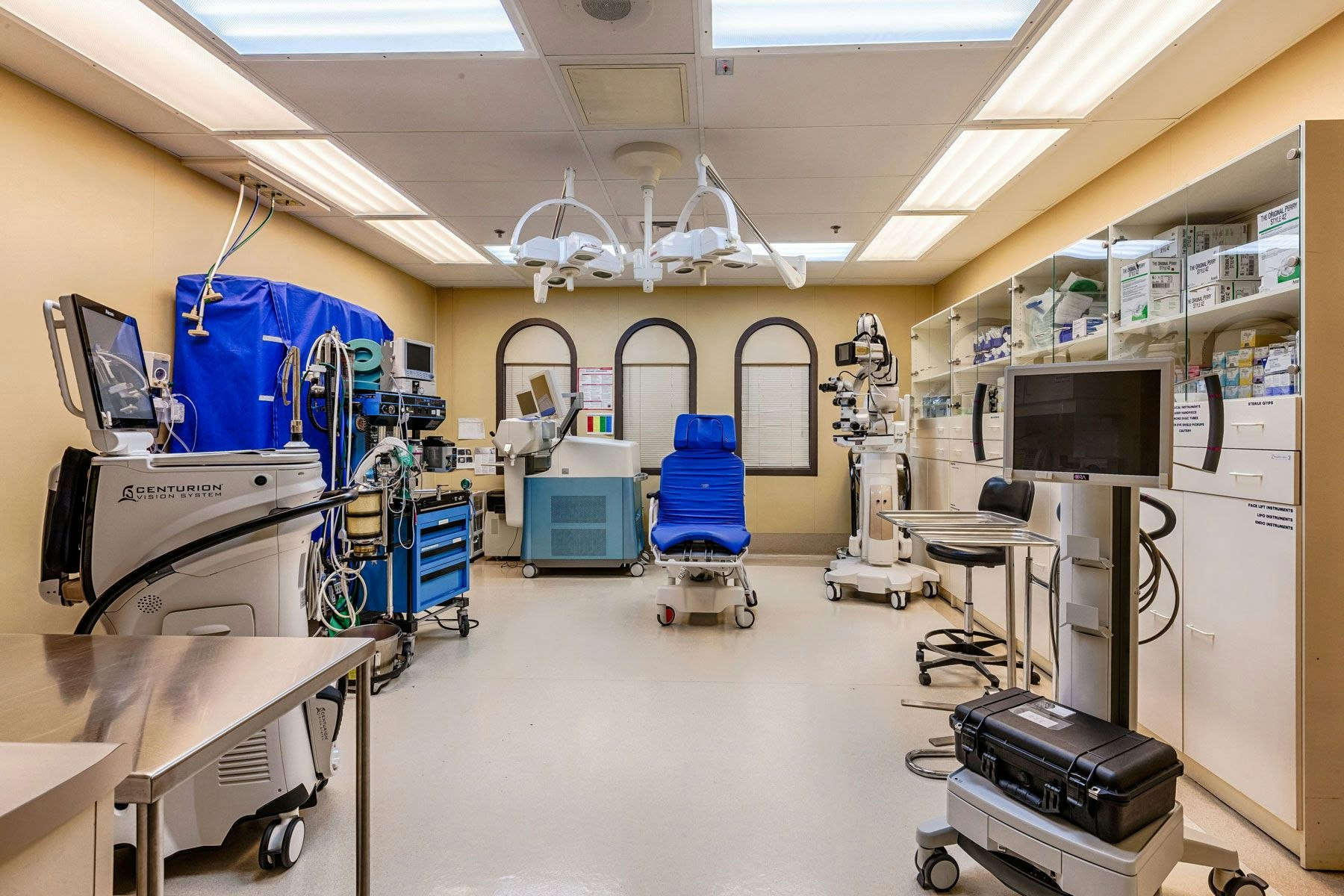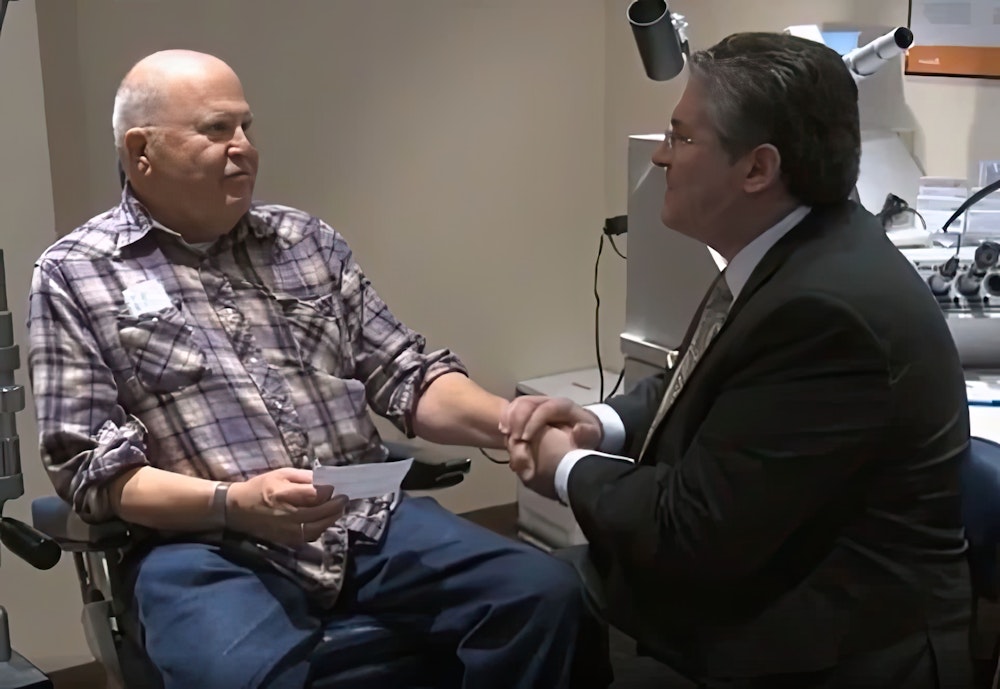Cataract Surgery Phoenix, AZ
"Everyone made me
feel like I was their
only patient."
— Annie, 5-Star Google Review
- 500+ 5-Star Reviews
Advanced Tech for Safety & Precision
IOLs for Every Need
Insurance & Financing Accepted
We Provide Safety & Precision Thanks to Advanced Technology
At Arizona Eye Institute & Cosmetic Laser Center, we use the latest technology to make cataract surgery safer, more precise, and more effective:

The LenSx® Laser and ORA® System help our surgeons fine-tune lens power, placement, and alignment for optimal results.
We use OCT imaging to detect early signs of glaucoma or macular degeneration and to scan the macula for preexisting conditions that could impact outcomes.
Corneal topography maps the eye’s surface to identify astigmatism.
The IOL Master precisely measures eye length for accurate lens selection.
Our advanced approach supports better vision and a smoother recovery.

We're Focused on You
When you visit our Phoenix-area vision centers in Sun City, Sun City West, and Wickenburg, we sit down with you and review your vision needs and your personal goals. Using this information, we develop a plan customized entirely to you. This ensures only the best results. You will also learn more about cataract surgery aftercare, with a detailed explanation of steps you can take to facilitate proper healing.
Your Comfort Matters to Us Anesthesia Options
To ensure total comfort during surgery, our practice offers two types of anesthesia: local and peribulbar, the latter of which immobilizes the eye. Both types of anesthesia are supplemented with intravenous sedation to further relax individuals.
Safely Remove Your Cataracts Contact Our Talented, Trustworthy Team
Dr. Emilio Justo and his team can improve your life through safe and effective cataract surgery. Our practice is built on providing personalized, dignified, and quality care to people throughout the Greater Phoenix area. Dr. Justo and other members of his team can converse in both English and Spanish and answer any questions you may have.
Our team of doctors is proud to be affiliated with several professional eye care organizations, including:
- The American Board of Ophthalmology
- The National Board of Medical Examiners
- The American Academy of Ophthalmology
If you have cataracts and are ready to discuss your needs with one of our experienced doctors, request a consultation online. You can also reach our offices by phone:

Georgia After Cataract Surgery
Georgia Lindsey discusses the way that Dr. Justo helped improve her vision with cataract surgery. She was having trouble doing puzzles, reading, and driving at night. After surgery at our Phoenix, AZ, practice, her vision restoration was remarkable.
Amazing, Life-Changing Results
“Since my youngest granddaughter was born, I literally have never seen her clearly. I was never able to see her face completely clear. But, after surgery, I opened my eyes and it just hit me that I could see her really clear! All I could say was, 'Oh my god, Grandma can see you now!' It was amazing. I saw details I never knew she had. It's been a long road, dealing with my vision throughout my life, and I am so grateful that I put my faith in Dr. Justo for such a life-changing surgery.”
— Kimberly N.
Payment Options
Insurance, Cash, and Credit Cards
Cataract surgery and monofocal (non-premium) IOLs are covered by most insurance providers, and we are in-network with many plans. Give us a call to find out if we are in-network with your provider. Patients are also welcome to pay with cash or make a credit card payment through our site.
Financing
Arizona Eye Institute & Cosmetic Laser Center accepts CareCredit® financing. Short-term, year-long options with zero-interest payments and long-term fixed-payment plans spanning three to five years are available. Enhancing your vision and quality of life is our focus.
Speak With Our Skilled Doctors About Treatments for Cataracts
If you live in the Greater Phoenix, AZ, area and suffer from cataracts, we encourage you to contact our experienced eye doctors online. You can also reach our offices by phone at:
Sun City West, AZ (623) 975-2020
Sun City, AZ (623) 876-2020
Wickenburg, AZ (928) 684-2020
“The surgery went great!”
“I have lived in AZ for 13 years and have used AZ Eye Institute since coming here. I absolutely love this practice. My husband had cataracts removed and the surgery went great. Anyone needing a great eye doctor , I recommend AZ Eye Institute!”
— Judy R., 5-Star Google Review
The Basics of Cataracts and Cataract Surgery
Dr. Emilio M. Justo is a board-certified ophthalmologist and a surgeon with three decades of experience. He established our practice in 1989, which has since expanded into one of the most trusted cosmetic and ophthalmology institutes in the Greater Phoenix, AZ, area. As the practice's Medical Director, he invests in state-of-the-art technology to ensure the best possible surgical outcomes.
Cataract Surgery Is Safe and Effective
In addition to being a common surgical procedure, advances in technology have made the removal of cataracts far safer, much less invasive, and more effective.
Our Phoenix practice uses computer-guided equipment to reduce human error and the risk of complications, and trifocal lenses to restore near, far, and intermediate vision.

The First Step Creating Your Individualized Treatment Plan
After a thorough examination with Dr. Justo to diagnose your condition and assess your candidacy, you will undergo a pre-operative counseling session with one of our technicians. Questions regarding the scope of your surgery will be clarified at this time, including:
Should I receive an intraocular lens?
Because the eye's natural, clouded lens is removed, almost all patients receive an IOL. This artificial lens becomes a part of the eye. The IOL focuses light to achieve crisp, clear vision and can correct farsightedness, nearsightedness, and astigmatism.
Which power lens will optimize my vision?
Our practice uses the most sophisticated, accurate technology available to determine which power of IOL is right for you. The length of your eye will be measured at this time, allowing the appropriate lens power to be selected for optimized vision.Which type of intraocular lens is right for me?
Monofocal lenses correct vision either far away or close up. Multi-focal lenses function much like bifocals, with new trifocal lenses that enhance vision at three distances. Toric lenses correct astigmatism while also improving your overall vision.
John After Cataract Surgery
John Caudlik underwent cataract surgery with Dr. Justo, which helped him maintain his independence. He was also very impressed with the safety protocols at our Phoenix facilities. Dr. Justo and his staff made him comfortable throughout the treatment process.
Fast-Focus Cataract Surgery
Our Phoenix, AZ, practice performs small-incision surgery, the most common and modern type of cataract removal. It is also known as no-stitch cataract surgery.
How the Surgery Works
A tiny incision is made at the side of the cornea, and a small probe is inserted into the eye. Phacoemulsification, or ultrasound technology, is then used to gently break up the cataract. After that is accomplished, the entire lens is gently vacuumed from the eye.
Benefits of Fast-Focus Surgery
Fast-focus cataract removal is a quick 15-minute outpatient surgery. You can expect to return home and resume many physical activities, such as bending and lifting. Thanks to the use of foldable intraocular implants and small incision techniques, no sutures are required.
Schedule an Eye Examination
Dr. Justo has helped thousands of individuals in the Phoenix, AZ, area thanks to fast focus cataract removal. To discuss your vision with a board-certified eye surgeon, request a consultation online. You can reach our offices by phone at:
Sun City West, AZ (623) 975-2020
Sun City, AZ (623) 876-2020
Wickenburg, AZ (928) 684-2020
“I am living life again!”
“Dr. Emilio Justo not only was the first to diagnose my cataracts, but he opened my eyes to how laser cataract surgery could truly improve my entire life. I chose the laser surgery, so that Dr. Justo could implant the TORIC lens in both eyes to correct my pre-existing astigmatism. It was the best choice I have ever made for my life. After surgery, I lost 30 pounds as my renewed vision made me excited to get in the game again, and do my best on my local softball league. I am forever grateful for Dr. Justo's personal care and concern, and I am living life again!”
— Glen N.
Before Surgery How Cataract Patients Can Prepare
In preparation for cataract removal at our Phoenix, AZ, centers, Dr. Justo may ask individuals to stop taking certain medications to decrease the risk of bleeding. He will take measurements of the shape and size of the eye and the curve of the cornea. This information helps him select the appropriate intraocular lens.
What to Expect During Cataract Surgery

“Cataract surgery can be life changing and it's one of the most gratifying procedures I can do to bring back a person's vision.” Dr. Justo
Cataract Removal Surgery
Cataract Surgery Recovery
It's crucial that you rest your eyes in the days after your cataract removal surgery. Dr. Justo uses a compounded "3-in-1" eye drop that contains two anti-inflammatory medications and a latest-generation antibiotic. Typically, you will be instructed to begin using the drops four times a day, starting three days before cataract surgery. You will continue using these medicated eye drops on a tapering schedule over four weeks.
It is important that you adhere to the instructions provided by our Phoenix, AZ, eye doctors to minimize the risk of infection. Though extremely rare, untreated infection can ultimately result in vision loss.
Your vision will begin to clear within the first few days, but it may take one to two weeks to achieve full visual potential. Full healing of the eye can take at least six weeks.
Results of Cataract Surgery
Schedule a Consultation for Cataract Surgery with Our Phoenix-Area Eye Surgeons
For more information about treating cataracts and improving your quality of life, contact our eye doctors. You can reach our offices serving Phoenix, AZ, by phone:
Sun City West, AZ (623) 975-2020
Sun City, AZ (623) 876-2020
Wickenburg, AZ (928) 684-2020
Patients Love Dr. Justo
"Dr. Justo and all of his staff are excellent. Highly recommend."
— Annette, 5-Star Google Review

Life After Cataract Removal
Having realistic expectations is important for appreciating your surgical results. Many individuals who've had their cataracts removed enjoy crisp, clear vision without glasses and contacts, but some will still rely on corrective eyewear for the best vision.
Each patient's outcome is dependent on a number of unique factors, like which type of IOL they choose to receive. Once your vision has stabilized, Dr. Justo will determine if you need glasses. If you do, measurements will be taken for your new prescription.
Generally, cataract surgery patients enjoy:
- Sharper vision
- A decreased dependency on glasses and contacts
- A reduction of glares and halos
- Brighter, more vivid colors
Fine-Tuning Your Vision After Cataract Removal
Follow-Up Visits
Dr. Justo meets with you personally to check that healing progresses smoothly. You will return to our office for checkups the day after surgery and one week later.
Assessing Vision
During the second post-operative appointment with Dr. Justo, your vision will be analyzed. We will determine whether or not you need a new glasses prescription.
Long-Term Monitoring
A long-term checkup at six months can further assess how your eyesight has benefited from cataract surgery. This commitment to aftercare ensures lasting outcomes.
Take the First Step
If you suffer from cataracts and would like to learn more about surgery, contact our practice online. You can reach our offices serving Phoenix, AZ, by calling:
Sun City West, AZ (623) 975-2020
Sun City, AZ (623) 876-2020
Wickenburg, AZ (928) 684-2020
We're Looking Forward to Making Good Things Happen for You
“After cataract surgery, most patients will comment how their life and their vision has improved dramatically.”
— Dr. Emilio Justo
Treating Astigmatism and Cataracts
If you suffer from astigmatism and are undergoing cataract surgery but are not a good candidate for LRI, Dr. Justo may recommend placement of an AcrySof® Toric premium intraocular lens. The right procedure for you can be discussed during the consultation process.





